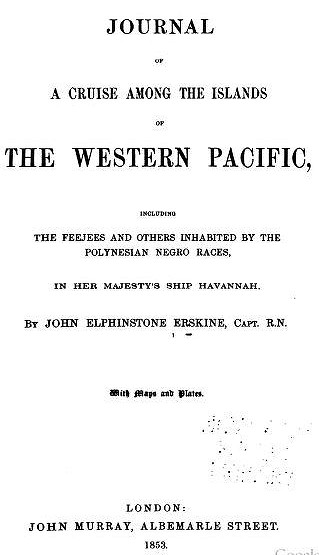
john erskine : float boards in loyalty islands, 1849
| home | catalogue | history | references | appendix |
 |
surfresearch.com.au
john erskine : float boards in loyalty islands, 1849 |
www.books.google.com
http://books.google.com/books?pg=PA372&id=d9kRAAAAYAAJ#v=onepage&q&f=false
Internet Archive
http://www.archive.org/details/journalacruisea00erskgoog
Open Library
http://openlibrary.org/books/OL16596842M/Journal_of_a_cruise_among_the_islands_of_the_western_Pacific
_including_the_Feejees_and_others_inhabi
-wikikpeia: Lifou
Island, viewed 22 April 2013.
http://en.wikipedia.org/wiki/Lifou_Island
In February 1848
Eskine was appointed to the Havannah as senior officer on the Australian
station.
He sailed from Russell,
New Zealand on 25 June 1849 for a tour of Samoa, Tonga, Fiji, the New Hebrides,
the Loyalty Islands and New Caledonia.
The Havannah
landed
in Port Jackson (Sydney) on 7 October 1849.
The earliest report
of "floatboards" used in Polynesia is possibly by Quiros
in the Marquesas Islands in 1595.
There are similar
reports of the use of "paddleboards" by other Polynesians, notably in the
Hawaiian Islands by Clerke in
1778, Ledyard
and Gilbert in 1779,
and Campbell in1812.
Lisiansky
(1804)
and Rugg (in D'Urville), c1840, reported the use of types of "floatboards"
at Easter Island (Rapa Nui).
This report initially noted in Haddon and Hornell: Canoes of Oceania (1975), Volume II, page 13.
Page 23
Having touched at Auckland, where, by the kindness of Sir George Grey, we were furnished with a handsome supply of axes, fish-hooks, and cotton cloth, for presents to the island chiefs, we sailed from the anchorage off Kororarika, in the Bay of Islands, on the 25th of June, 1849, at 2 P.M., with the first of a W. S.W. wind, accompanied by very fine weather, and a rising barometer.
Chap.
V.
Feejee
Islands
Page 256
Perfection in the athletic exercises of swimming, throwing the spear or club, and handling a canoe, seems to be attained at an early age, and I never met a lad or girl who was not acquainted with the native name of any blade of grass or leaf of a tree, which might be exhibited to them.
Chap.
VII.
New
Hebrides, New Caledonia, Loyalty Islands.
Passing Porcupine
Point we steered out of Suaka Bay, by the same passage between the reefs,
by which we had entered, seeing again the excellent seamark of One Tree
Island to the S.E.
After being well
clear of the barrier reef, we ran with the wind still light from the N.W.
35 miles, on an E. N. N. course, then E. 4 S. 20 miles to avoid any dangers
which might exist on the south side of Uea, and afterwards hauled up N.E.
by E. i E., which brought us in sight of the island of Lifii by daybreak.
15th September.At 8 A.M. we distinguished the N.W. point of Lifu, and stood into a large bay, of which it forms one side, in an angle of which we anchored at 11 o'clock in 13 fathoms, the bluff or western head, covered with pine-trees, bearing W.S.W., the south point of the Great Bay S.S.W. 13 or 14 miles, and the eastern point of the smaller one in which we lay, E.
Chap. VII
We had not been
long at an anchor, before the surface of the bay was seen dotted with the
heads of the natives who, both men and women, were swimming off to the
ship.
A few had a rough
log of wood as a kind of assistance, but it was not till later in the day
that one or two small outrigger canoes,
and a rude raft,
or catamaran, made their appearance, the latter being occupied and sculled
almost entirely by women
John Elphinstone
Erskine (1805-1887), naval officer, was born on 13 July 1805 at Cardross,
Scotland, son of David Erskine and his wife Keith, daughter of the 11th
Baron Elphinstone.
He entered the navy
on 6 May 1819, was commissioned in 1826 and assumed his first command of
the gunboat Arachne on the Jamaica station in 1829.
After service in
the Mediterranean, he was promoted captain on 28 June 1839 and served as
flag captain to his cousin, Sir Charles Adam, on the West Indies station.
From 1845 to 1847
he was on half-pay and in February 1848 was appointed to the Havannah
as
senior officer on the Australian station.
Soon after his arrival
Erskine made a tour of Samoa, Tonga, Fiji, the New Hebrides, the Loyalty
Islands and New Caledonia between 25 June and 7 October 1849, and next
year visited the Solomons and other islands.
An account of the
first cruise was published in 1853 as Journal of a Cruise Among the
Islands of the Western Pacific
in Her Majesty's Ship Havannah.
Lively and intelligent,
Erskine was popular in Sydney society, became friendly with the Macarthur
family and in 1851 published his description of a visit to the goldfields
in A Short Account of the Late Discoveries of Gold in Australia.
In that year, he
contributed an account of his two Pacific voyages to the Journal of the
Royal Geographical Society.
- Australian Dictionary
of Biography.
http://adb.anu.edu.au/biography/erskine-john-elphinstone-3484
 |
Journal of a Cruise among the Islands of the Western Pacific, including the Feejees and others inhabited by the Polynesian negro races, in Her Majesty's ship Havannah. J. Murray, London, 1853. Internet Archive
|

| home | catalogue | history | references | appendix |